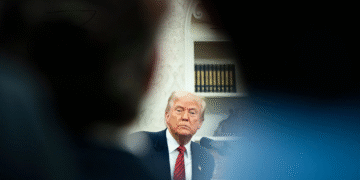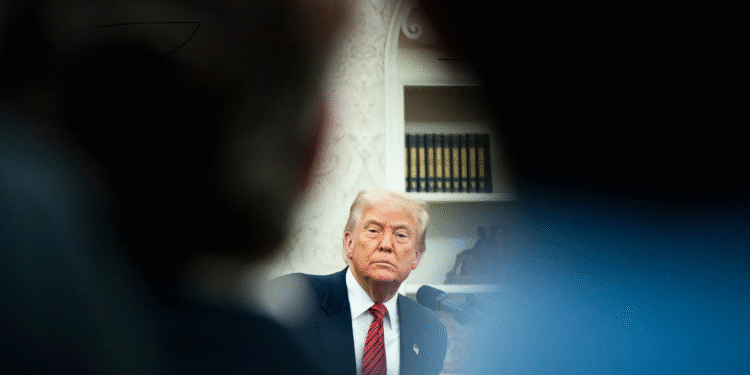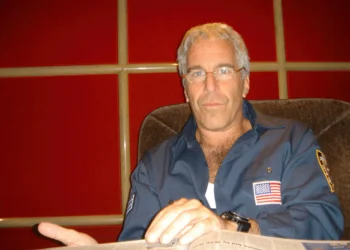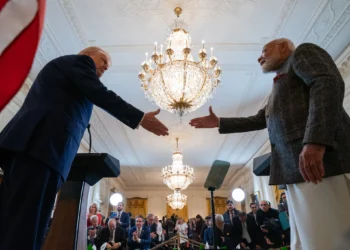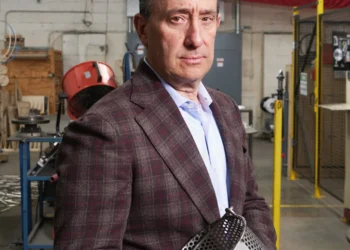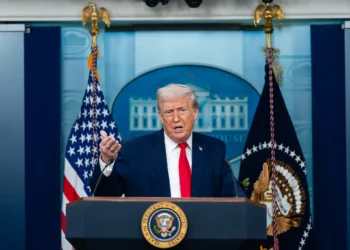Trump to Receive $16 Million from Paramount to Settle “60 Minutes” Lawsuit
Trump had filed a lawsuit in response to an interview with former Vice President Kamala Harris. The company needs government permission for a multi-billion dollar transaction.
In an unprecedented surrender by a big media company to a sitting president, Paramount stated late Tuesday that it had reached an agreement to pay President Trump $16 million to end his lawsuit against the editing of an interview on the CBS News program “60 Minutes.”
According to Paramount, the payment included Mr. Trump’s legal fees and costs, and the funds, less the legal fees, will be donated to Mr. Trump’s future presidential library.

As part of the settlement, Paramount stated that it had agreed to publish written transcripts of forthcoming “60 Minutes” interviews with candidates for president. The corporation stated that the agreement did not include an apology.
The agreement is the clearest proof to date that Mr. Trump can use his power to bully prominent American organizations, including the media sector.
Because the network did not publish anything factually incorrect and the First Amendment grants publishers a great deal of latitude in deciding how to present information, many attorneys had dismissed Mr Trump’s case as without merit and believed that CBS would have ultimately won in court.
But Shari Redstone, the chair and majority owner of Paramount, informed her board that she preferred looking into a deal with Mr Trump. The president’s case was seen by some business officials as a possible impediment to the multibillion-dollar deal between the company and the Hollywood studio Skydance, which needs the approval of the Trump administration.
Two sources close to the negotiations stated that attorneys for Paramount and Mr. Trump worked throughout the weekend to strike an agreement before a court deadline that would have required both parties to start producing internal documents for discovery, following weeks of discussions with a mediator. Another deadline was approaching: This week, Paramount intended to alter its board of directors, which may have made the settlement discussions more difficult.
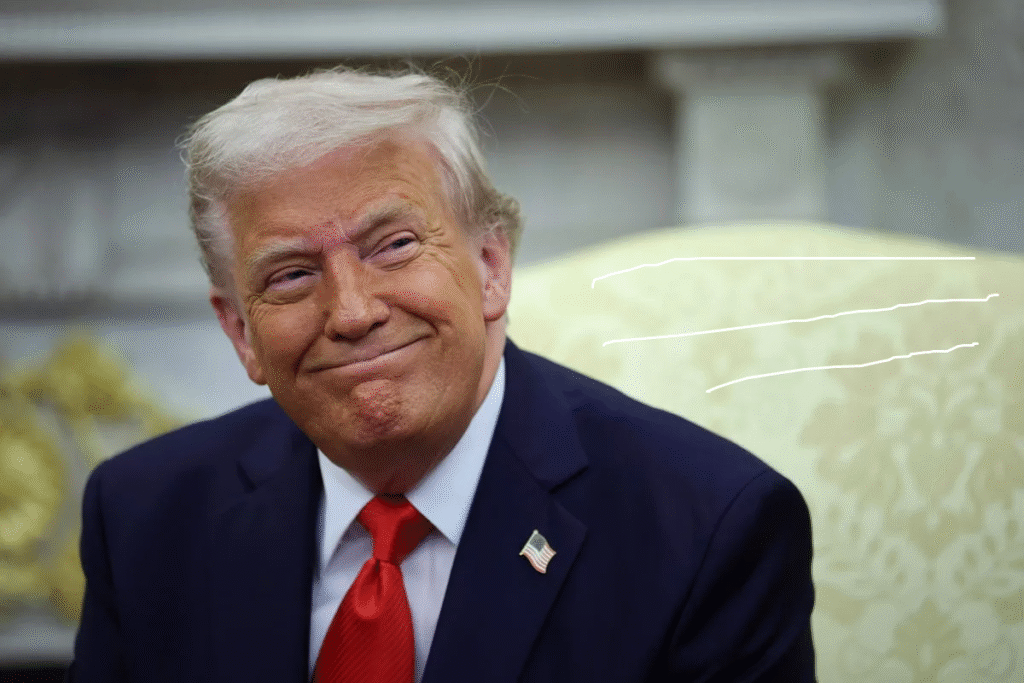
According to a statement released by a representative for Mr. Trump’s legal team, the agreement was “another win for the American people” brought about by the president, who was “holding the fake news media accountable.”
“CBS and Paramount Global recognized the strength of this historic case and had no alternative but to settle,” the spokesperson stated.
The settlement amount of $16 million is the same sum that ABC News agreed to pay in December to resolve a defamation lawsuit brought by Mr Trump and one of its anchors George Stephanopoulos. Paramount’s board was worried that paying a larger sum to settle the case might put the business at risk of future lawsuits from shareholders claiming bribery.
The Redstone family’s decades-long ownership of CBS News and Paramount Pictures would come to an end with the sale of Paramount, giving it to David Ellison, the son of tech billionaire Larry Ellison, who has supported Mr Trump.
The president’s lawsuit against Paramount was unrelated to the Federal Communications Commission’s assessment of the company’s merger with Skydance, according to FCC chairman Brendan Carr. Additionally, Paramount has stated that the two concerns are unrelated.
A potential settlement was seen in the CBS newsroom as a low point in the nearly century-long history of a network that once featured Walter Cronkite and Edward R. Murrow, whose well-known defiance of McCarthyism in the 1950s was recently portrayed on the Broadway stage by George Clooney. “60 Minutes,” which pioneered on-air investigative reporting, just finished its 51st straight season as the most popular news program in the United States.
In order to influence the election, Mr. Trump filed a $10 billion lawsuit against Paramount last year, alleging that “60 Minutes” fraudulently altered an interview with former Vice President Kamala Harris.
The interview transcript revealed that Ms. Harris provided a comprehensive response to a query regarding Benjamin Netanyahu, Israel’s prime minister. In a preview of the interview on “Face the Nation,” another CBS News program, around 21 seconds of that response was broadcast. The following day, “60 Minutes” aired a different seven-second segment of the response during its prime-time broadcast.
In the lawsuit Mr Trump argued that CBS engaged in “news distortion” in an attempt to tilt the balance in favor of the Democratic Party. That description was challenged by Paramount.

The lawsuit filed by Mr. Trump, along with Ms. Redstone’s apparent willingness to consider a settlement, had already thrown CBS News into chaos prior to its conclusion. The “60 Minutes” executive producer, Bill Owens, resigned due to network disputes over how to deal with the president’s legal assaults; Wendy McMahon, the president of CBS News, was later fired.
Many CBS reporters who followed the events of Mr. Trump’s case thought that the long-term integrity of “60 Minutes” was at stake. According to veteran “60 Minutes” correspondent Scott Pelley, any settlement would be “very damaging to CBS, to Paramount, to the reputation of those companies.”
CBS and Paramount executives paid closer attention than usual to parts of “60 Minutes” that may have been seen as critical of the Trump administration. Although the pressure did not cause CBS News to kill a story, when Mr. Owens resigned in April, he claimed that he would not be permitted to exercise independent journalistic judgment. Ms. McMahon stated that it had “become clear the company and I do not agree on the path forward” when she departed.
Redstone informed the board that because her financial stake in the ongoing Skydance transaction is so much higher than that of other shareholders, whose interests the directors are expected to represent, she was withdrawing herself from the board’s deliberations on how to handle the Trump law suit. She has just started receiving therapy after being diagnosed with thyroid cancer this spring.
However, she informed the board members that she would like the firm to look into a settlement with Mr. Trump even before she received her diagnosis. Redstone has stated that she wishes to stay out of a lengthy legal battle with the president, which could cost hundreds of millions of dollars and put other divisions with government ties in danger.
Ms. Redstone has also confided to friends that she has doubts regarding CBS News’ editorial discretion. She has admitted that some of the news coverage on her network has bothered her, and at times she has brought up these issues in public and discussed them with the company’s management.

Bernie Sanders of Vermont and Elizabeth Warren of Massachusetts, among other senators, have cautioned that any payment Paramount makes to Mr. Trump may be interpreted as a bribe, and they have stated that they will explore the possibility of holding a congressional hearing on the matter.
Paramount’s directors were concerned about the possibility of being accused of bribery and perhaps facing legal consequences as a result, so they had to balance the commercial advantages of a settlement with the impression that they were approving a transaction in order to finalize an unrelated merger.
The Freedom of the Press Foundation, a First Amendment organization, has said that in the case of a settlement, it intends to file a lawsuit against Ms. Redstone and the Paramount board on behalf of shareholders; the group has enlisted the well-known litigator Abbe Lowell to represent it in its case.
On Wednesday, Paramount intends to make modifications to its board. The company plans to add three new directors: Roanne Sragow Licht, an adjunct professor at Boston University; Charles E. Ryan, a co-founder of Almaz Capital; and Mary Boies, counsel to the law firm Boies Schiller Flexner. Judith McHale, a longtime director, is retiring.
